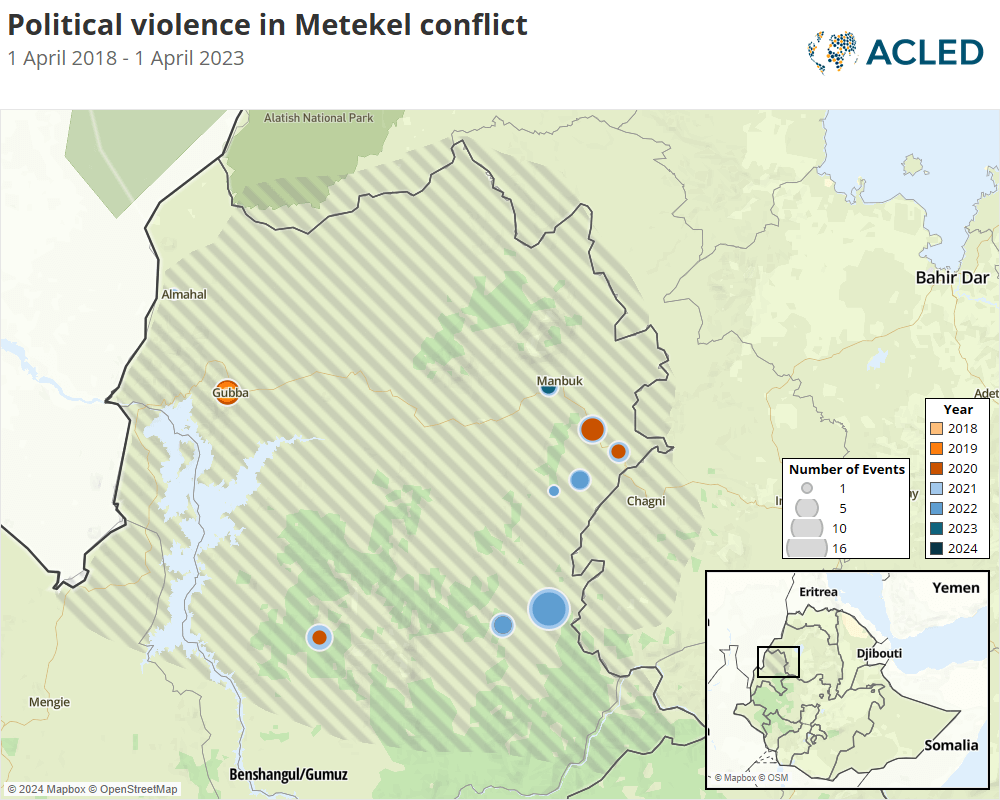Throughout 2020 and 2021, Metekel zone was one of the most violent areas in the country. From 1 April 2018 to 31 December 2021, ACLED records 1394 reported fatalities from 83 political violence events in the zone, while from 1 January 2022 to 30 April 2024, ACLED has recorded 180 reported fatalities and 36 political events. These numbers are likely a conservative estimate. Most of these events were recorded in 2020 and 2021, the height of political violence in Metekel zone (see map below). Over 26% of these fatalities are linked to attacks mounted by unspecified ethnic militias on ethnic Amhara civilians.

Official sources have not identified the perpetrators of the violence, although they are likely made up of Gumuz ethnic militias who may be associated with more officially organized ethno-nationalist movements like the Gumuz Liberation Front (for more, see the EPO Weekly, 5-11 March 2022). The local population sometimes blames the Oromo Liberation Army (OLA) — referred to by the government as the Oromo Liberation Front (OLF)-Shane, a splinter of the Oromo Liberation Front — as being behind the killings, which the latter denies. Some OLF leaders also believe that splinter groups that once belonged to the OLF could be responsible.1Semir Yusuf, ‘Drivers of ethnic conflict in contemporary Ethiopia,’ Institute for Security Studies, 9 December 2019 Government sources have accused “anti-peace forces” which have links with Sudan and the Tigray People’s Liberation Front (TPLF) to have perpetrated the violence.2Ethiopia Broadcasting Corporation, ‘The agents of the terrorist TPLF who infiltrated the coastal areas of Benshangul Gumuz were destroyed,’ 19 November 2023
The conflict in Metekel has deep roots. The area is inhabited by Gumuz, Shinasha, Amhara, Oromo, Agew, and other ethnic groups. The Gumuz and Shinasha are identified as ‘Indigenous’ ethnic groups, while ethnic Amharas who resettled from the neighboring Amhara region into the fertile lands in Benishangul/Gumuz region have been labeled as ‘settlers’ – triggering land conflicts between the two groups. This issue was exacerbated by the ethnic-based politics of the Ethiopian People’s Revolutionary Democratic Front, which came to power in 1991 and designated ethnic Gumuz as the political rulers in the area. This effectively excluded ethnic Amharas (and other settlers) from political representation and exposed them to attacks by ethnic-based militias and a lack of proper government protection.3Tom Gardner, ‘All Is Not Quiet on Ethiopia’s Western Front,’ Foreign Policy, 6 January 2021
In the face of increasing fatalities as a result of attacks on Amhara civilians during 2020 and 2021, Amhara authorities began to demand that additional actions be taken. In December 2020, the commissioner of the Amhara regional state police requested that the responsibility for solving the crisis in Benshangul/Gumuz region be granted to his forces, or that the federal government intervene.4Amhara Mass Media Agency, Youtube publication, 7 December 2020 Officials of Benshangul/Gumuz region reacted to these requests by labeling them as “repeated threats of intimidation.”5Benshangul/Gumuz Regional Government Communication Issues Office, ‘Press statment from Benshangul Gumuz Prosperity Party,’ 15 December 2020
In January 2021, the federal government declared a state of emergency in the Metekel zone and federal troops took control of security in the area.6Ethiopian Broadcasting Corporation, ‘It has been decided to create an organization to protect the community from attacks by organizing militias recruited from internally displaced people from Metekel: Mr. Demeke Mekonen,’ 23 January 2021 This official transfer of security responsibility represents a formal intervention by multiple factions of the federal government into the regional affairs of Benshangul/Gumuz region. On the one hand, this satisfied the demands of officials from the neighboring Amhara region without exposing the Metekel zone to the complications that would have occurred had the Amhara region been involved directly. On the other hand, it exposed ethnic Gumuz communities to a heavy crackdown by the Ethiopian armed forces, resulting in alleged massacres of civilians by federal troops and the dismissal of political leaders.7Addis Standard, ‘News: Security forces kill scores of civilians, arrest several in Metekel after attack by rebels killed three, wounded seven; Ethiopia accuses Egypt & Sudan for persistent violence,’ 8 March 2021; Negasa Desalegn, Shewaye Legese, and Negash Mohamed, ‘Benishangul Gumuz Prosperity Party’s apologise,’ Deutsche Welle Amharic 11 February 2021
The government has made enormous efforts to bring peace to the Metekel zone, with what appears to have had varying amounts of success. The army has also implemented the training of communal militias8Ethiopian Broadcasting Corporation, ‘It has been decided to create an organization to protect the community from attacks by organizing militias recruited from internally displaced people from Metekel: Mr. Demeke Mekonen,’ 23 January 2021 and taken steps to reshape the police into a multi-ethnic force.9Ethiopian Broadcasting Corporation, ‘A leadership transition is being made based on the composition of the ethnic groups living in Metekel zone: the task force,’ 20 February 2021 The regional government is using traditional elders to bring sustainable peace to the area. For instance, in June 2022, a traditional peace and reconciliation ceremony was held in Wemebera woreda in Metekel zone. Selected elders from 11 kebeles of Wemebera woreda came together for the ceremony.10Fana Broadcasting Corporate, ‘It has been stated that peace is returning to Metekel zone through traditional reconciliation ceremonies,’ 24 June 2022 Further, following the government’s call to surrender peacefully, various members of different armed groups decided to disarm peacefully. In August 2022, around 246 militants peacefully surrendered to the Metekel zone command post in Dangur woreda.11Ethiopian Broadcasting Corporation, ‘246 militants who accepted the government’s call for peace in Dangur woreda in Metekel zone, returned,’ 9 August 2022 On 3 May 2023, 73 members of a Gumuz armed group which were active in Kota Kebele in Dangur woreda in Meteke zone accepted the government’s call to resolve their differences through negotiation,’ and returned to Gilgel Belles town with their weapons.
This conflict profile was last updated on 05/08/2024.

